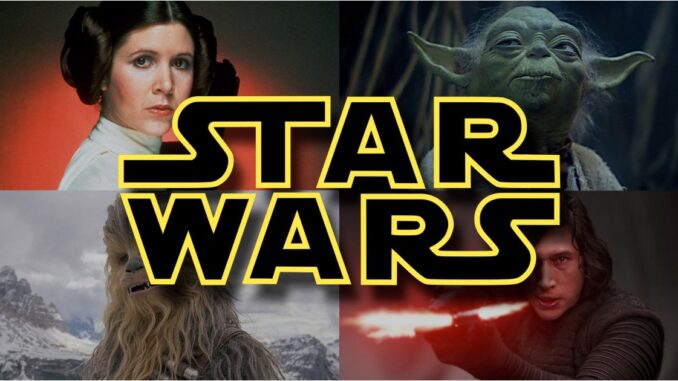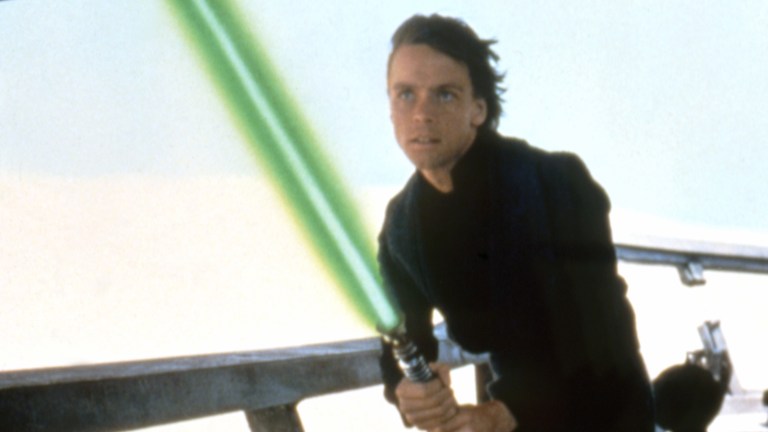
David Lynch and the Star Wars: Return of the Jedi That Might Have Been
When it came time to find a director for Star Wars: Return of the Jedi, David Lynch was at the top of George Lucas’ list. So what happened?

Imagine you’re George Lucas. Imagine that you’ve just watched a weird experimental, black-and-white movie called Eraserhead. It doesn’t make sense, but it perfectly captures the anxieties anyone faces right before becoming a parent. Also, there’s an unbelievable baby monster creature that looks unlike anything you’ve seen before.
Then imagine you watch another movie by the same director, called The Elephant Man. It’s still black and white and has its surrealistic touches, but it tells a deeply humanistic story about a man with debilitating physical deformities asserting his dignity.
What do you do next? If you’re the real Lucas, you say, “I want this guy to make Star Wars!”
As strange as it sounds, Lucas admires David Lynch so much that he tried to get the famous idiosyncratic filmmaker to direct the third entry in the Original Trilogy, Return of the Jedi.
Why George Lucas Wanted David Lynch for Return of the Jedi
Whatever his openly romantic and often deeply upsetting oeuvre may suggest, Lynch himself is an affable Midwesterner, a practitioner of Transcendental Meditation who has a reputation as a nice guy. Lynch began his career as a painter, but switched to animation and filmmaking because he wanted to see his pictures move.
After a few live-action and animated shorts, Lynch received funding from the American Film Institute to make his first feature, Eraserhead. He worked with a very small crew and remained buoyed by donations from his star Jack Nance (or, more accurately, Nance’s wife at the time, Sissy Spacek). When the film was finally picked up for distribution, it became a staple of midnight showings and gathered a cult following that included several influential people, including not only Lucas but also Mel Brooks.
Brooks hired Lynch to direct The Elephant Man, based on a script by Christopher De Vore and Eric Bergren that his production company had optioned. Thanks to the larger budget and involvement of more powerful producers, The Elephant Man had a cast of heavy hitters, including John Hurt as John Merrick and Anthony Hopkins as Doctor Frederick Treves. Despite some surreal sequences here and there, The Elephant Man played as a relatively straightforward biopic, which received critical praise and eight Academy Award nominations.
Given the film’s success, it was easy to see why Lucas considered Lynch for the job. Many directors, including Lucas himself, indulge themselves in more esoteric works early in their career, and slowly veer toward mainstream work as they gain confidence. Furthermore, both Eraserhead and The Elephant Man demonstrate Lynch’s facility with special effects, a quality needed for anyone working on a Star Wars film.
The Eraserhead director wasn’t actually Lucas’ first choice to direct the third Star Wars movie. It was Steven Spielberg, who by the early ’80s had already made Jaws, Close Encounters of the Third Kind, and Raiders of the Lost Ark, and would soon turn his attention to E.T. the Extra-Terrestrial. But the Director’s Guild of America barred Spielberg from directing Return of the Jedi after Lucas dropped out of the union due to a dispute over The Empire Strikes Back.
Fans have long known that Lucas then pursued Lynch for Return of the Jedi, but the full story didn’t come out until a 2010 interview. Lynch said at the time: “I was asked by George to come up to see him about directing what would be the third Star Wars. And I had next door to zero interest.”
In between delightful digressions about a restaurant that only serves salad and the way that Lucas drove his Ferrari, Lynch admitted in the interview that he “always admired George” because Lucas “is a guy who does what he loves.” Lynch identified with that approach because he too does what he loves, although he noted that “the difference is, what George loves makes hundreds of billions of dollars.”
Despite those pleasant intentions, Lynch admits to feeling “a little bit of a headache” when Lucas started showing him some of the art from the film, especially “these things called Wookiees.” In short, Lynch rejected the idea of making the movie.
“Even before I got home, I kind of crawled into a phone booth, and I called my agent and said, ‘There’s no way! There is no way I can do this!’ He said, ‘David, David, David…Calm down! You don’t have to do this,’” Lynch said. “So George, bless his heart, I told him on the phone the next day that he should direct it. It’s his film. He invented everything about it. But he doesn’t really love directing. So someone else did directly that film. But I called my lawyer and told him I wasn’t going to do it. And he said, ‘You just lost, I don’t know how many millions of dollars.’ But it’s okay.”
Even before being forced to learn what a Wookiee was, Lynch had his doubts about science fiction. Lynch shared in his book of interviews Lynch on Lynch that he doesn’t particularly enjoy the genre: “I’ve never even really liked science fiction. I like elements of it, but it needs to be combined with other genres. And, obviously, Star Wars was totally George’s thing.”
Of course, Lucas didn’t take Lynch’s advice and instead turned to other candidates, including David Cronenberg, before ultimately giving the reigns to genre filmmaker Richard Marquand. Perhaps taking the advice of his lawyer about the millions he could make on a big-budget film, Lynch’s next took the job to direct Frank Herbert’s Dune for Dino De Laurentiis.
While that particular project didn’t end well, it strengthened Lynch’s auteur spirit and convinced him to avoid trying to play with big studios. He followed the failure of Dune with Blue Velvet, Wild at Heart, and Twin Peaks
The Return of the Jedi That Might Have Been
It’s actually hard to imagine that Lynch’s version of Star Wars would be much different than the one helmed by Marquand. Although Lynch didn’t care much for science fiction or Star Wars in particular, Dune was the one outlier. Even then, Lynch took an interest in Dune because he thought it would give him the opportunity to create worlds, something that Lucas liked to do himself. There have long been rumors that Marquand found it difficult to work with Lucas’ hands on approach to producing, and that it was the Maker himself who ended up ghost directing the film. How much of Marquand’s vision actually made it to the big screen remains a subject of debate within the fandom. It seems really unlikely that an auteur like Lynch would have fared much better. One only needs to watch at the theatrical cut of Dune, which the director has since disowned, for proof.
While YouTube creators have spliced clips from Jedi and Lynch’s movies to make a hypothetical “Lynch Cut” of the film, and surely some doofus dabbling in AI will eventually program “David Lynch’s Return of the Jedi” (we all can guess what Lynch would think of that idea), the finished film would likely have little of Lynch’s authorial voice. After all, the best he got in Dune were some gross visuals, an even more mutated Guild Navigator, and, by accident, Patrick Stewart with a pug. Still, it’s fun to imagine what Lynch would have done had Lucas given him free rein on the project.
Lynch likes his heroes to be paragons like Sailor from Wild at Heart or Agent Cooper from Twin Peaks, men who endure bizarre difficulties and whose inherent goodness manifests in unusual ways, but remains resolute. We can see how he would have treated Darth Vader more like a manifestation of the Force’s dark side, bombarding his enemies with nightmarish visions (which was actually plot point in Leigh Brackett’s draft of The Empire Strikes Back). But like the Lodge Spirits of Twin Peaks, he and Kenobi or Yoda wouldn’t map so cleanly into Lucas’s good guy and bad guy distinction. Lynch might have enjoyed some of the darker endings for the film Lucas and screenwriter Lawrence Kasdan flirted with, though.
Given his fascination with women in trouble, the hero of Lynch’s Return of the Jedi may very well have been Leia, especially with her newly-revealed connection to Luke and Vader. Where Leia and Han of the finished Return of the Jedi get shoved into side quests, the pull Leia feels between Luke and Vader might have become the true crux of the film, making for the surreal set pieces that Lynch loves so much.
But as fun as the thought exercise is, it’s probably for the best that this collaboration never happened and that movie history ran its course. All these years later, we now get to marvel not only at how well Return of the Jedi turned out but also what a fascinating oddity Lynch’s Dune truly is. We’re glad Lucas showed Lynch those Wookiees.
